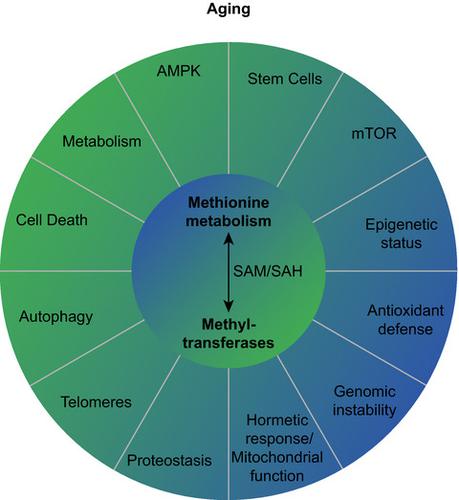当前位置:
X-MOL 学术
›
Aging Cell
›
论文详情
Our official English website, www.x-mol.net, welcomes your
feedback! (Note: you will need to create a separate account there.)
Methionine metabolism and methyltransferases in the regulation of aging and lifespan extension across species.
Aging Cell ( IF 8.0 ) Pub Date : 2019-08-28 , DOI: 10.1111/acel.13034 Andrey A Parkhitko 1 , Patrick Jouandin 1 , Stephanie E Mohr 1 , Norbert Perrimon 1, 2
Aging Cell ( IF 8.0 ) Pub Date : 2019-08-28 , DOI: 10.1111/acel.13034 Andrey A Parkhitko 1 , Patrick Jouandin 1 , Stephanie E Mohr 1 , Norbert Perrimon 1, 2
Affiliation

|
Methionine restriction (MetR) extends lifespan across different species and exerts beneficial effects on metabolic health and inflammatory responses. In contrast, certain cancer cells exhibit methionine auxotrophy that can be exploited for therapeutic treatment, as decreasing dietary methionine selectively suppresses tumor growth. Thus, MetR represents an intervention that can extend lifespan with a complementary effect of delaying tumor growth. Beyond its function in protein synthesis, methionine feeds into complex metabolic pathways including the methionine cycle, the transsulfuration pathway, and polyamine biosynthesis. Manipulation of each of these branches extends lifespan; however, the interplay between MetR and these branches during regulation of lifespan is not well understood. In addition, a potential mechanism linking the activity of methionine metabolism and lifespan is regulation of production of the methyl donor S‐adenosylmethionine, which, after transferring its methyl group, is converted to S‐adenosylhomocysteine. Methylation regulates a wide range of processes, including those thought to be responsible for lifespan extension by MetR. Although the exact mechanisms of lifespan extension by MetR or methionine metabolism reprogramming are unknown, it may act via reducing the rate of translation, modifying gene expression, inducing a hormetic response, modulating autophagy, or inducing mitochondrial function, antioxidant defense, or other metabolic processes. Here, we review the mechanisms of lifespan extension by MetR and different branches of methionine metabolism in different species and the potential for exploiting the regulation of methyltransferases to delay aging.
中文翻译:

蛋氨酸代谢和甲基转移酶在跨物种衰老和寿命延长的调节中。
蛋氨酸限制 (MetR) 可延长不同物种的寿命,并对代谢健康和炎症反应产生有益影响。相反,某些癌细胞表现出蛋氨酸营养缺陷,可用于治疗,因为减少饮食蛋氨酸可以选择性抑制肿瘤生长。因此,MetR 代表了一种可以延长寿命并具有延缓肿瘤生长的补充作用的干预措施。除了在蛋白质合成中的功能外,蛋氨酸还参与复杂的代谢途径,包括蛋氨酸循环、转硫途径和多胺生物合成。操纵这些分支中的每一个都可以延长寿命;然而,MetR 与这些分支在寿命调节过程中的相互作用尚不清楚。此外,连接蛋氨酸代谢活性和寿命的一个潜在机制是调节甲基供体S-腺苷蛋氨酸的产生,该蛋氨酸在转移甲基后,转化为S-腺苷高半胱氨酸。甲基化调节多种过程,包括那些被认为通过 MetR 延长寿命的过程。尽管 MetR 或蛋氨酸代谢重编程延长寿命的确切机制尚不清楚,但它可能通过降低翻译速率、修改基因表达、诱导毒物兴奋反应、调节自噬或诱导线粒体功能、抗氧化防御或其他代谢过程来发挥作用。 。在这里,我们回顾了不同物种中 MetR 和蛋氨酸代谢的不同分支延长寿命的机制,以及利用甲基转移酶的调节来延缓衰老的潜力。
更新日期:2019-08-28
中文翻译:

蛋氨酸代谢和甲基转移酶在跨物种衰老和寿命延长的调节中。
蛋氨酸限制 (MetR) 可延长不同物种的寿命,并对代谢健康和炎症反应产生有益影响。相反,某些癌细胞表现出蛋氨酸营养缺陷,可用于治疗,因为减少饮食蛋氨酸可以选择性抑制肿瘤生长。因此,MetR 代表了一种可以延长寿命并具有延缓肿瘤生长的补充作用的干预措施。除了在蛋白质合成中的功能外,蛋氨酸还参与复杂的代谢途径,包括蛋氨酸循环、转硫途径和多胺生物合成。操纵这些分支中的每一个都可以延长寿命;然而,MetR 与这些分支在寿命调节过程中的相互作用尚不清楚。此外,连接蛋氨酸代谢活性和寿命的一个潜在机制是调节甲基供体S-腺苷蛋氨酸的产生,该蛋氨酸在转移甲基后,转化为S-腺苷高半胱氨酸。甲基化调节多种过程,包括那些被认为通过 MetR 延长寿命的过程。尽管 MetR 或蛋氨酸代谢重编程延长寿命的确切机制尚不清楚,但它可能通过降低翻译速率、修改基因表达、诱导毒物兴奋反应、调节自噬或诱导线粒体功能、抗氧化防御或其他代谢过程来发挥作用。 。在这里,我们回顾了不同物种中 MetR 和蛋氨酸代谢的不同分支延长寿命的机制,以及利用甲基转移酶的调节来延缓衰老的潜力。











































 京公网安备 11010802027423号
京公网安备 11010802027423号